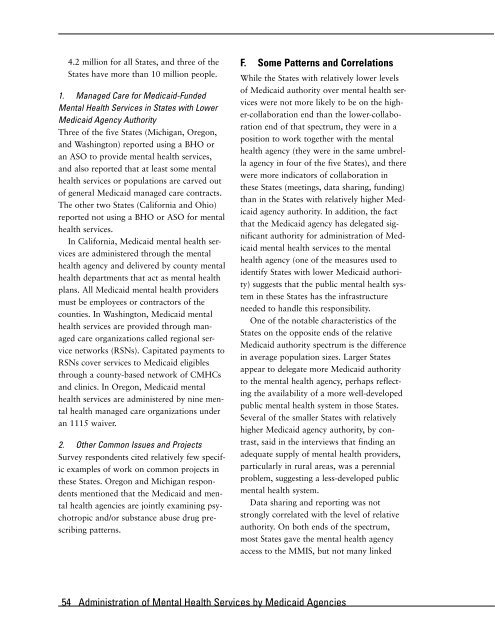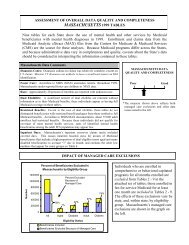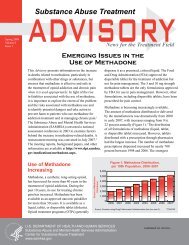Administration of Mental Health Services by Medicaid Agencies
Administration of Mental Health Services by Medicaid Agencies
Administration of Mental Health Services by Medicaid Agencies
You also want an ePaper? Increase the reach of your titles
YUMPU automatically turns print PDFs into web optimized ePapers that Google loves.
4.2 million for all States, and three <strong>of</strong> theStates have more than 10 million people.1. Managed Care for <strong>Medicaid</strong>-Funded<strong>Mental</strong> <strong>Health</strong> <strong>Services</strong> in States with Lower<strong>Medicaid</strong> Agency AuthorityThree <strong>of</strong> the five States (Michigan, Oregon,and Washington) reported using a BHO oran ASO to provide mental health services,and also reported that at least some mentalhealth services or populations are carved out<strong>of</strong> general <strong>Medicaid</strong> managed care contracts.The other two States (California and Ohio)reported not using a BHO or ASO for mentalhealth services.In California, <strong>Medicaid</strong> mental health servicesare administered through the mentalhealth agency and delivered <strong>by</strong> county mentalhealth departments that act as mental healthplans. All <strong>Medicaid</strong> mental health providersmust be employees or contractors <strong>of</strong> thecounties. In Washington, <strong>Medicaid</strong> mentalhealth services are provided through managedcare organizations called regional servicenetworks (RSNs). Capitated payments toRSNs cover services to <strong>Medicaid</strong> eligiblesthrough a county-based network <strong>of</strong> CMHCsand clinics. In Oregon, <strong>Medicaid</strong> mentalhealth services are administered <strong>by</strong> nine mentalhealth managed care organizations underan 1115 waiver.2. Other Common Issues and ProjectsSurvey respondents cited relatively few specificexamples <strong>of</strong> work on common projects inthese States. Oregon and Michigan respondentsmentioned that the <strong>Medicaid</strong> and mentalhealth agencies are jointly examining psychotropicand/or substance abuse drug prescribingpatterns.F. Some Patterns and CorrelationsWhile the States with relatively lower levels<strong>of</strong> <strong>Medicaid</strong> authority over mental health serviceswere not more likely to be on the higher-collaborationend than the lower-collaborationend <strong>of</strong> that spectrum, they were in aposition to work together with the mentalhealth agency (they were in the same umbrellaagency in four <strong>of</strong> the five States), and therewere more indicators <strong>of</strong> collaboration inthese States (meetings, data sharing, funding)than in the States with relatively higher <strong>Medicaid</strong>agency authority. In addition, the factthat the <strong>Medicaid</strong> agency has delegated significantauthority for administration <strong>of</strong> <strong>Medicaid</strong>mental health services to the mentalhealth agency (one <strong>of</strong> the measures used toidentify States with lower <strong>Medicaid</strong> authority)suggests that the public mental health systemin these States has the infrastructureneeded to handle this responsibility.One <strong>of</strong> the notable characteristics <strong>of</strong> theStates on the opposite ends <strong>of</strong> the relative<strong>Medicaid</strong> authority spectrum is the differencein average population sizes. Larger Statesappear to delegate more <strong>Medicaid</strong> authorityto the mental health agency, perhaps reflectingthe availability <strong>of</strong> a more well-developedpublic mental health system in those States.Several <strong>of</strong> the smaller States with relativelyhigher <strong>Medicaid</strong> agency authority, <strong>by</strong> contrast,said in the interviews that finding anadequate supply <strong>of</strong> mental health providers,particularly in rural areas, was a perennialproblem, suggesting a less-developed publicmental health system.Data sharing and reporting was notstrongly correlated with the level <strong>of</strong> relativeauthority. On both ends <strong>of</strong> the spectrum,most States gave the mental health agencyaccess to the MMIS, but not many linked54 <strong>Administration</strong> <strong>of</strong> <strong>Mental</strong> <strong>Health</strong> <strong>Services</strong> <strong>by</strong> <strong>Medicaid</strong> <strong>Agencies</strong>
















